In the dynamic world of logistics and transportation, understanding trailer truck specifications is paramount for businesses aiming to optimize their fleet operations. At CarMax Vehicle, we specialize in manufacturing high-quality semi-trailers tailored to meet diverse transportation needs. This comprehensive guide delves into the intricate details of trailer truck specifications, providing valuable insights to help you make informed decisions for your fleet.
Table of Contents
- Introduction to Trailer Truck Specifications
- Key Components of a Trailer Truck
- Types of Trailer Trucks
- Load Capacity and Weight Specifications
- Dimensions and Size Considerations
- Engine and Powertrain Specifications
- Safety Features and Compliance
- Customization Options with CarMax Trailer
- Maintenance and Durability
- Choosing the Right Trailer Truck for Your Business
- Frequently Asked Questions
Introduction to Trailer Truck Specifications
Trailer truck specifications encompass a wide range of parameters that define the performance, capacity, and suitability of a semi-trailer for various transportation tasks. These specifications are critical for ensuring that the trailer aligns with the operational demands of different industries, from construction and manufacturing to retail and logistics.
At CarMax Vehicle, we meticulously design our trailers to meet and exceed industry standards, offering a blend of reliability, efficiency, and versatility. Understanding these specifications empowers fleet managers to select trailers that enhance productivity while adhering to regulatory requirements.

Key Components of a Trailer Truck
A trailer truck is a complex assembly of various components, each playing a crucial role in its overall functionality. Let’s explore the primary components that constitute a trailer truck:
Chassis and Frame
The chassis serves as the structural backbone of the trailer truck, providing the necessary support for all other components. Constructed from high-strength steel or aluminum alloys, the frame must withstand the stresses of heavy loads and prolonged use.
Key Features:
- Material: High-tensile steel or aluminum for lightweight and strength
- Design: Modular designs for easy customization
- Reinforcement: Enhanced welding techniques for increased durability
Axles and Suspension
Axles bear the weight of the trailer and its cargo, while the suspension system ensures a smooth ride by absorbing shocks and vibrations from the road.
Axles:
- Number: Typically 2 to 5 axles depending on load capacity
- Type: Single, tandem, or tridem axles for varying weight distributions
Suspension Systems:
- Air Suspension: Provides better load handling and ride comfort
- Leaf Spring Suspension: Cost-effective and robust for heavy-duty applications

Braking Systems
Efficient braking systems are vital for the safety and control of trailer trucks. They ensure the trailer can be stopped promptly and reliably under various conditions.
Types of Brakes:
- Air Brakes: Common in heavy-duty trailers for their reliability and strength
- Electric Brakes: Typically used in lighter trailers for simpler applications
Components:
- Brake Lines and Actuators: Essential for transmitting braking force
- ABS Systems: Advanced systems to prevent wheel lock-up during braking
Tires and Wheels
Tires and wheels are the interface between the trailer and the road, making their quality and specifications critical for performance and safety.
Tire Specifications:
- Size: Depends on load capacity and vehicle type
- Type: All-terrain, highway, or specialized tires for specific needs
- Pressure: Proper inflation is essential for optimal performance and longevity
Wheel Features:
- Material: Typically steel or aluminum for strength and durability
- Bearing Systems: High-quality bearings to reduce friction and wear
Types of Trailer Trucks
Different types of trailer trucks are designed to cater to specific cargo requirements. Understanding the various types helps businesses select the most appropriate trailer for their needs.
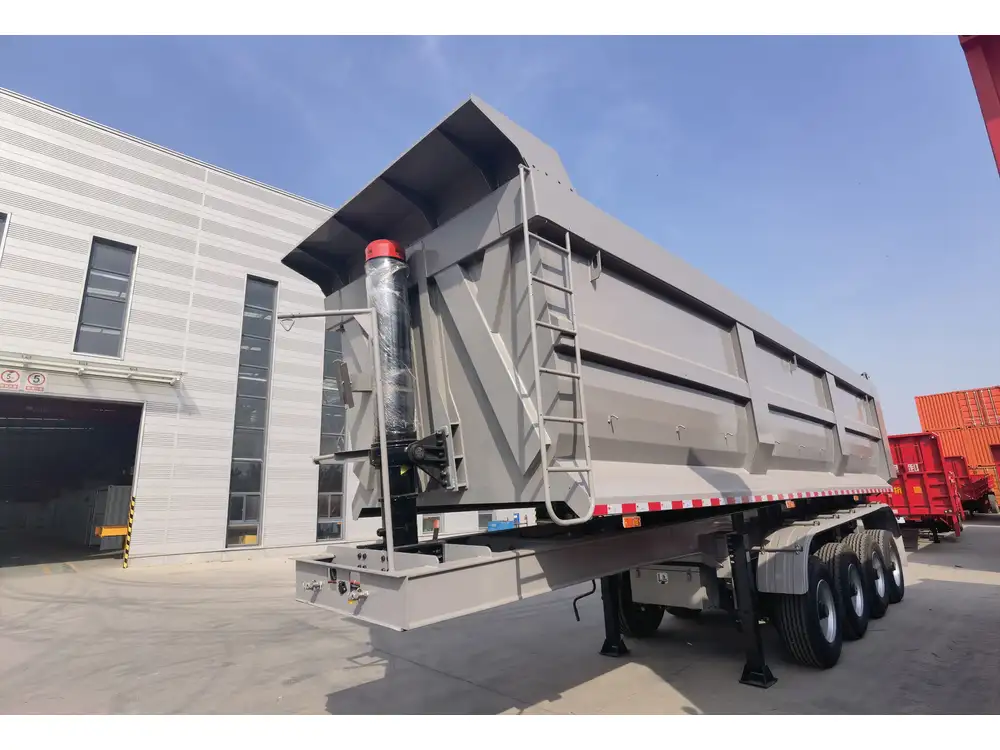
Flatbed Trailers
Flatbed trailers are versatile and widely used for transporting a variety of goods, especially oversized or irregularly shaped cargo.
Key Characteristics:
- Open Design: No sides or roof, facilitating easy loading and unloading
- Adjustable Ties: Secure cargo of varying sizes and shapes
- Load Capacity: Typically ranges from 40,000 to 80,000 lbs GVWR
Refrigerated Trailers
Refrigerated trailers, or reefers, are essential for transporting perishable goods that require temperature-controlled environments.
Key Features:
- Insulated Walls: Maintain consistent internal temperatures
- Cooling Systems: Powered by auxiliary refrigeration units
- Temperature Controls: Adjustable settings for different cargo needs
Tank Trailers
Tank trailers are specialized for transporting liquids, gases, and other bulk materials that require containment within a sealed environment.
Specifications:
- Material: Stainless steel or aluminum to prevent corrosion
- Capacity: Varies widely, often exceeding 30,000 gallons
- Safety Features: Pressure gauges, venting systems, and emergency shutoffs
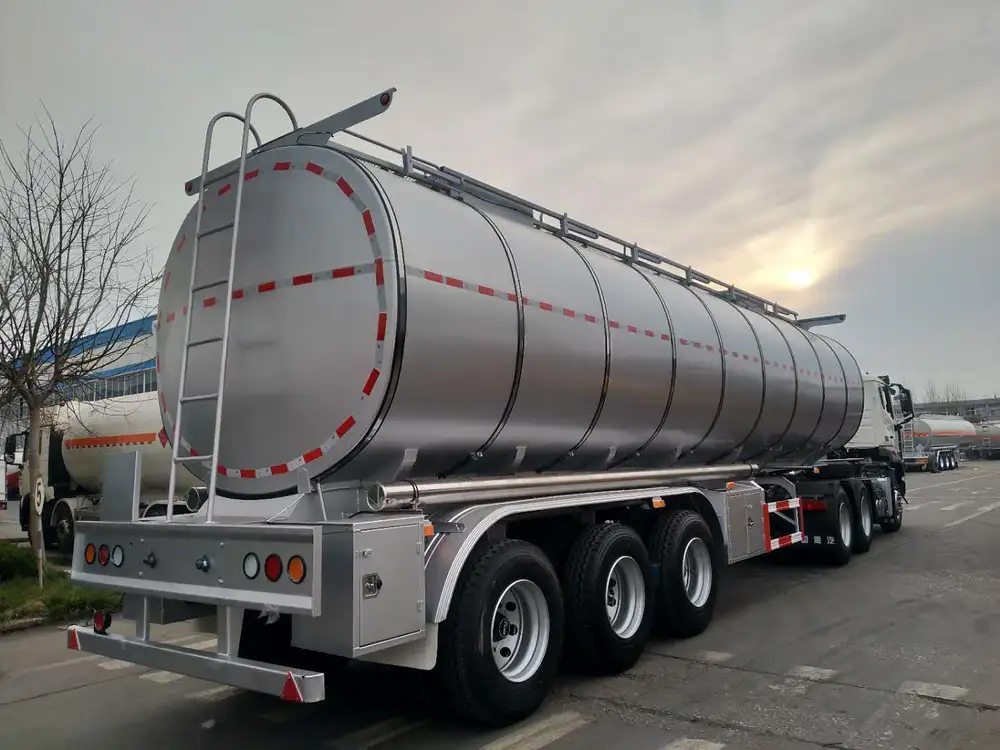
Lowboy Trailers
Lowboy trailers feature a lower deck height, making them ideal for transporting heavy and oversized equipment with a low center of gravity.
Advantages:
- Reduced Height: Allows for easier transport of tall or bulky items
- Heavy Load Capacity: Capable of carrying exceptionally heavy payloads
- Sturdy Construction: Enhanced frame strength to support oversized loads
Load Capacity and Weight Specifications
Understanding load capacity and weight specifications is crucial for ensuring safe and efficient transportation.
Gross Vehicle Weight Rating (GVWR)
GVWR is the maximum allowable total weight of the trailer truck, including the trailer itself and the cargo.
Calculation: [ \text{GVWR} = \text{Trailer Weight} + \text{Cargo Weight} ]
Importance:
- Compliance: Adhering to GVWR avoids legal penalties and ensures road safety
- Performance: Overloading can strain components, leading to increased wear and potential failures

Payload Capacity
Payload capacity refers to the maximum weight the trailer can carry, excluding its own weight.
Determination: [ \text{Payload Capacity} = \text{GVWR} – \text{Trailer Weight} ]
Considerations:
- Cargo Type: Different goods may distribute weight unevenly
- Axle Configuration: Affects how weight is distributed across the trailer
Dimensions and Size Considerations
The size of a trailer truck affects its suitability for various routes and cargo types. Key dimensions to consider include length, height, and width.
Overall Length and Height
Length:
- Standard Lengths: Common lengths range from 40 to 53 feet
- Impact: Longer trailers offer more cargo space but may face restrictions on certain routes
Height:
- Maximum Heights: Typically capped at 13.5 to 14 feet in many regions
- Height Clearance: Essential for ensuring compatibility with bridges, tunnels, and overpasses
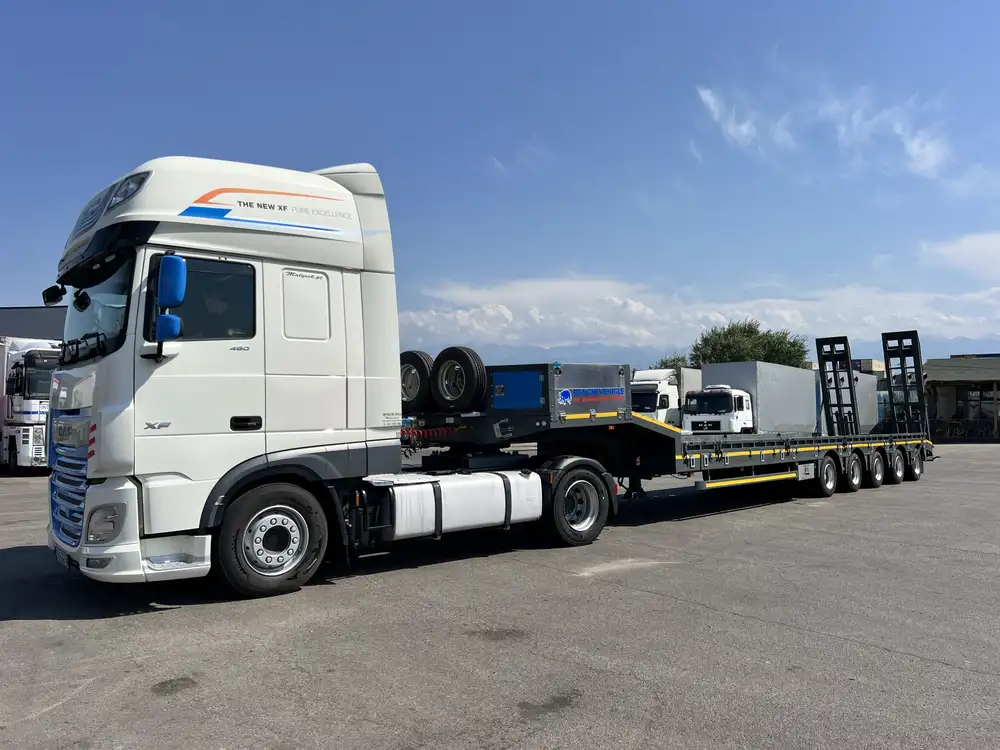
Width Regulations
Width regulations vary by region and must be adhered to for legal compliance.
Standard Width:
- United States: Generally limited to 102 inches
- International Standards: May vary slightly depending on country-specific regulations
Impact on Design:
- Cargo Arrangement: Ensures stability and prevents overhangs
- Permitting: Adheres to weight and size limits to avoid fines and delays
Engine and Powertrain Specifications
The engine and powertrain are critical for the performance and efficiency of a trailer truck.
Engine Types
Different engine types cater to varying performance and fuel efficiency needs.
Common Engine Types:
- Diesel Engines: Preferred for their torque and fuel efficiency in heavy-duty applications
- Electric Engines: Emerging as eco-friendly alternatives with lower emissions
Key Specifications:
- Horsepower (HP): Determines the power available for towing and acceleration
- Torque: Essential for hauling heavy loads and maintaining speed on inclines

Transmission Systems
The transmission system transfers engine power to the wheels, influencing the truck’s performance and fuel economy.
Types of Transmissions:
- Manual Transmissions: Offer greater control but require more driver skill
- Automatic Transmissions: Provide ease of use and smoother shifting
Considerations:
- Gear Ratios: Affect acceleration and fuel efficiency
- Maintenance Requirements: Different systems have varying upkeep needs
Safety Features and Compliance
Safety is paramount in trailer truck operations, and compliance with regulations ensures the well-being of drivers and cargo.
Lighting Systems
Proper lighting is essential for visibility and signaling during transport, especially under adverse conditions.
Components:
- Headlights and Tail Lights: Ensure visibility to other drivers
- Marker Lights: Indicate the trailer’s presence and width
- Brake Lights: Signal when the vehicle is slowing down or stopping
Regulatory Compliance:
- Color Standards: Adhere to color codes for different light functions
- Placement Standards: Ensure lights are correctly positioned for maximum visibility

Instrumentation and Monitoring
Advanced instrumentation provides real-time data to optimize performance and ensure safety.
Features:
- Speedometers and Odometers: Track speed and distance traveled
- Telematics Systems: Monitor vehicle health, location, and driver behavior
- Load Sensors: Ensure cargo is within weight limits and properly balanced
Benefits:
- Enhanced Safety: Immediate alerts for potential issues
- Operational Efficiency: Data-driven insights for maintenance and routing
Customization Options with CarMax Trailer
At CarMax Trailer, we understand that each business has unique transportation needs. Our customization options ensure that our trailer trucks align perfectly with your specific requirements.
Material Selection
Choosing the right materials enhances durability and performance based on your cargo types.
Options:
- Aluminum Alloys: Lightweight and corrosion-resistant, ideal for refrigerated and sensitive cargo
- Steel Frames: Provide superior strength for heavy-duty applications
- Composite Materials: Combine the benefits of different materials for specialized uses

Specialized Configurations
We offer tailored configurations to accommodate a wide range of industries and cargo types.
Examples:
- Custom Ramp Designs: Facilitates easier loading and unloading for different equipment
- Adjustable Platforms: Accommodate varying cargo sizes and weights
- Integrated Shelving Systems: Optimize storage space for smaller items
Advantages:
- Flexibility: Adaptable to changing cargo demands
- Efficiency: Streamlined loading processes reduce downtime
Maintenance and Durability
Ensuring the longevity and reliability of your trailer truck requires diligent maintenance and the use of durable materials.
Preventative Maintenance
Regular maintenance minimizes the risk of unexpected breakdowns and extends the lifespan of your trailer.
Key Practices:
- Routine Inspections: Check for wear and tear on critical components
- Lubrication: Maintain moving parts to reduce friction and prevent damage
- Brake Testing: Ensure braking systems function correctly under all conditions
Schedule:
- Daily Checks: Tires, lights, and load security
- Weekly Maintenance: Brake systems and suspension components
- Monthly Overhauls: Comprehensive inspections of engine and transmission systems

Durable Materials and Build Quality
Investing in high-quality materials and construction techniques enhances the durability of your trailer truck.
Material Benefits:
- Corrosion-Resistant Alloys: Extend the life of the chassis and frame
- Reinforced Joints: Prevent structural failures under heavy loads
- Impact-Resistant Coatings: Protect against environmental damage and wear
Build Quality:
- Precision Engineering: Ensures all components fit and function seamlessly
- Quality Control: Rigorous testing processes to identify and rectify defects before delivery
Choosing the Right Trailer Truck for Your Business
Selecting the appropriate trailer truck is a strategic decision that impacts your operational efficiency and bottom line. Consider the following factors when making your choice:
- Cargo Type: Different trailers are designed for specific types of cargo. Assess the nature of your goods to determine the most suitable trailer type.
- Load Capacity: Ensure the trailer can handle your typical load weights without exceeding GVWR limits.
- Operational Routes: Consider the dimensions and weight regulations of the roads and routes you frequently use.
- Customization Needs: Identify any specialized requirements that may necessitate custom features or configurations.
- Budget Constraints: Balance your needs with your budget, considering both initial costs and long-term maintenance expenses.
At CarMax Vehicle, our team works closely with clients to evaluate these factors and recommend trailer truck specifications that align with their unique business requirements.
Frequently Asked Questions
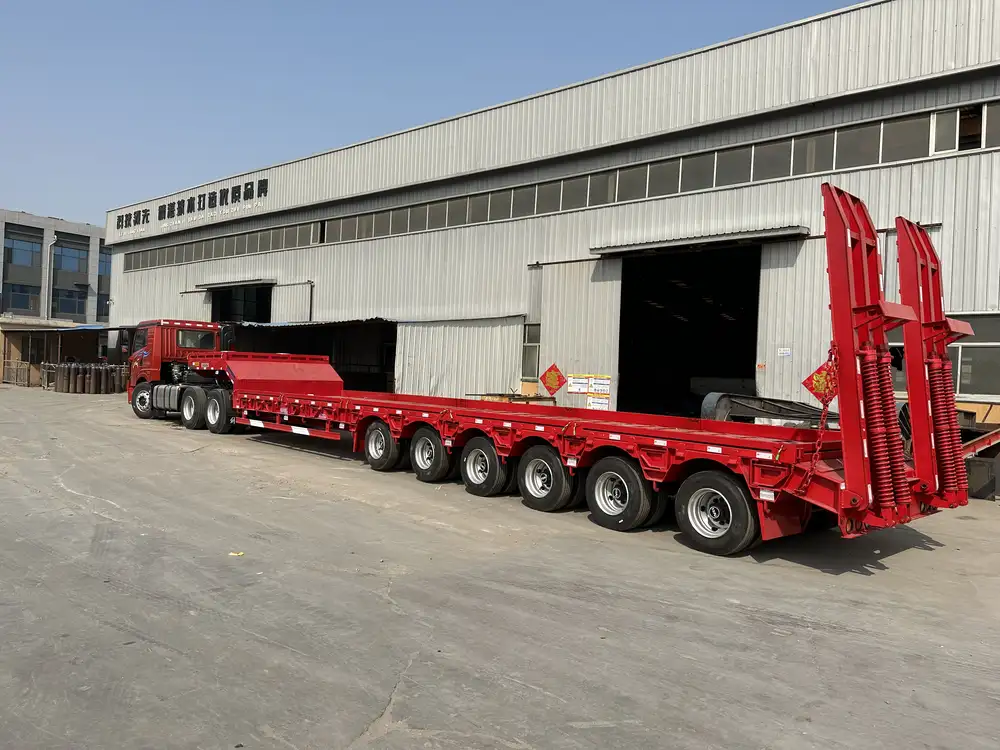
1. What is the maximum payload capacity of CarMax Trailers?
CarMax Trailers offer a wide range of payload capacities, typically ranging from 40,000 lbs to over 80,000 lbs GVWR, depending on the specific model and configuration. Custom options are available to meet specialized needs.
2. How do I determine the right type of trailer for my cargo?
Consider the nature, size, and weight of your cargo. Flatbed trailers are versatile for various loads, refrigerated trailers are ideal for perishable goods, tank trailers suit liquid and gas transport, and lowboy trailers are best for oversized and heavy equipment.
3. What maintenance is required to ensure the longevity of my trailer truck?
Regular preventative maintenance is essential. Perform daily checks on tires, lights, and load security, weekly maintenance on brakes and suspension, and monthly comprehensive inspections of engine and transmission systems. Additionally, follow the manufacturer’s guidelines for servicing and part replacements.
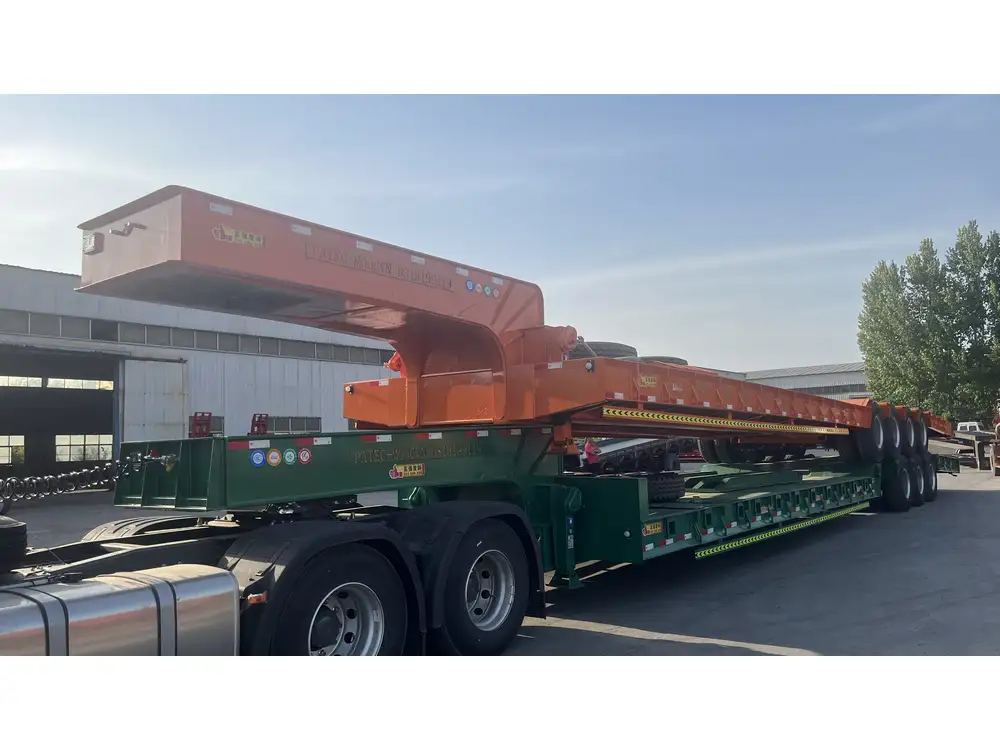
4. Can CarMax Trailers be customized to fit specific industry requirements?
Absolutely. CarMax Trailers offer extensive customization options, including material selection, specialized configurations, and integrated features tailored to meet the unique demands of different industries and cargo types.
5. What safety features are included in CarMax Trailer models?
Our trailers come equipped with advanced safety features such as ABS braking systems, comprehensive lighting setups, real-time monitoring instruments, load sensors, and reinforced structural components to ensure safe and reliable transportation.
By understanding and leveraging the detailed specifications of trailer trucks, businesses can enhance their logistics operations, ensuring efficiency, safety, and compliance. At CarMax Vehicle, we are committed to providing top-tier trailer solutions that cater to your specific needs, driving your business forward with reliability and excellence.



